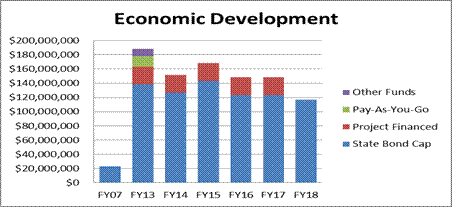Quick Links
- Report
- Introduction
- Administration Accomplishments & Initiatives
- Development of the FY14-18 Capital Investment Plan
- Affordability and Fiscal Responsibility
- Impact of Capital Budget on the Operating Budget
- Capital Investments in Gateway Cities
- Aggregate FY14-18 Capital Investment Plan
- Capital Investments by Investment Category
- Appendix A - Debt Affordability Analysis
- Appendix B - Bond Bills
- Appendix C - FY14 Capital Investment Project List, by Investment Category (pdf)
- Appendix D - FY14 Capital Project and Program Descriptions, by Project ID# (pdf)
- Plan by Investment
- Plan by Capital Agency
- Plan by Beneficiary Agency
- Downloads
Economic Development
The Massachusetts economy is the largest in New England, and having a robust economy is important not only for the Commonwealth’s own citizens, but also for the economic vitality of the region and the country. Our economic recovery has been fueled by support and investments in the innovation economy, advanced manufacturing and life sciences. These investments have allowed the Massachusetts economy to regain all of the jobs lost during the recession and to continue growing.
A critical component of the Governor’s recovery plan for Massachusetts is not only to stimulate job creation in the short-term, but to make investments that support long-term economic growth. The Patrick Administration is focused on accomplishing this through strategically targeted capital investments that attract private investment and support the innovation economy of the future.
The following graph reflects the Administration’s estimated capital investment in economic development projects and programs over the next five years, as compared to fiscal years 2007 and 2013 economic development related spending.

Administration Accomplishments to Date
- Through the START Matching Grant Program, MassVentures has provided grants totaling $3 M to 20 companies.
- The Massachusetts Broadband Institute (MBI) at the Massachusetts Technology Collaborative was created in August 2008 by the Patrick Administration and the Legislature with a mission to expand affordable broadband access to the underserved and unserved communities of the Commonwealth. The MBI was initially funded with $40 M in state bond funds and has used these funds to leverage over $110 M in additional public and private investment as well as over $83 M in additional federal funds. These funds have been used to successfully deploy the $90 M, 1,200-mile fiber-optic MassBroadband 123 network bringing high-speed Internet access directly to over 1,200 facilities in more than 120 western and central Massachusetts communities. The network will be completely operational by the end of the 2013 calendar year.
- Massachusetts has demonstrated its commitment to the
life sciences community through investments in infrastructure to
accelerate promising science, as well as to create a business-friendly
environment. The Massachusetts Life Sciences Center (MLSC) is committed
to ensuring that there is a strong supporting platform for innovation in
Massachusetts. This includes funding the creation of novel resources that
companies and researchers will be able to find only in Massachusetts.
The Governor has committed to investing $500 M in life sciences capital funding over ten years. To date, the MLSC has committed more than $325 M to capital projects across the Commonwealth. Through its capital funding, the MLSC has created more than 3,100 jobs in the building trades and in the life sciences.
- The Administration created the MassWorks Program, which is a consolidation of six grant programs through Chapter 238 of the Acts of 2012. The MassWorks Infrastructure Program and the associated prior grant programs have supported over 150 infrastructure projects to advance housing, economic development and small town transportation safety improvements across the Commonwealth since 2007. MassWorks Infrastructure Projects represent not only thousands of construction jobs but also the creation of thousands of new full and part-time jobs, hundreds of new housing units and millions of private investment dollars which are leveraged through the strategic investment of MassWorks funding. In FY13, the MassWorks program made awards to 26 communities.
FY14 Highlights
- $62.6 M will be invested in Governor Patrick’s Life Sciences Initiative in FY14, an $8.7 M increase over FY13. These capital investments provide funding for over 15 projects including the University of Massachusetts Amherst’s new life sciences laboratories, Boston Children’s Hospital, LabCentral, Northern Essex Community College, the University of the Massachusetts Dartmouth’s Biomanufacturing Facility, the Joslin Diabetes Center, and the Dana Farber Cancer Institute.
- The Commonwealth will contribute $3.2 M to MassVenture’s START program which will continue to provide grants to help growing companies commercialize technologies developed under federal Small Business Innovation Research (SBIR) contracts.
- The Commonwealth will provide $13.4 M to the Massachusetts Broadband Institute in FY14. Additionally, the Commonwealth will invest $10 M in the MBI “Last Mile Project” to bring broadband from the MassBroadband 123 network to homes and businesses.
- In FY14, the MassWorks Infrastructure Program will announce its third annual funding awards for public infrastructure projects. The third MassWorks round will place an emphasis on mixed-use multi-family housing opportunities throughout the Commonwealth in support of the Governor’s housing production goal announced in November 2012. MassWorks also has a number of significant, ongoing projects that it will continue to support in FY14 including the construction of the new MBTA station at Assembly Square, infrastructure to support the mixed use redevelopment of the Pleasant Street Mills in Easthampton, roadway infrastructure to support the 230 new market rate housing units in Chelsea and many others.
- Infrastructure Investment Incentive Program (I-Cubed) projects are underway at Assembly Square in Somerville and Fan Pier in Boston. The I-Cubed program invests in public infrastructure through an innovative cost and risk sharing arrangement among the Commonwealth, the municipality and the private developer.
- The I-Cubed program also has several pending economic development proposals at various stages of review which could increase the number of I-Cubed projects in Massachusetts to as many as 9 projects in the next few years. The ongoing I-Cubed projects in Somerville and Boston are expected to leverage $1 B in private investment and create over 1,000 construction and 2,000 permanent jobs.
 top of page
top of page